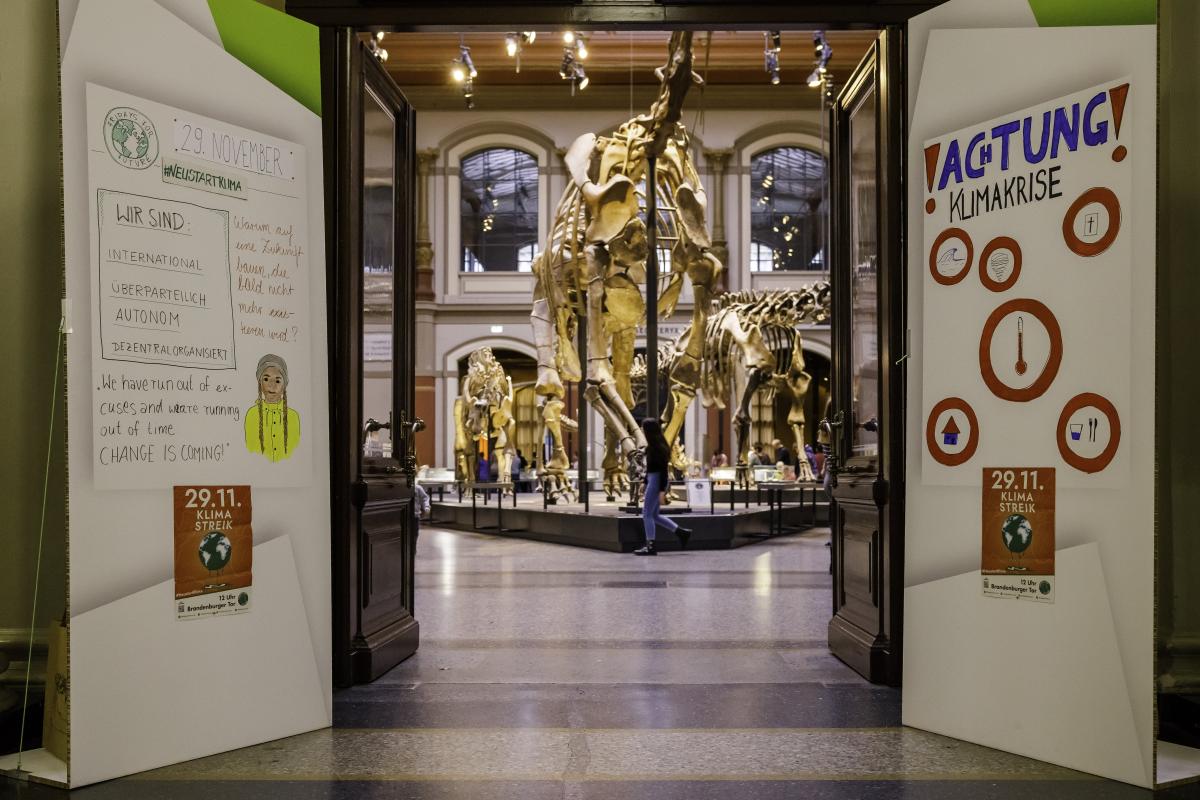For months, young people around the world have been taking to the streets for a better climate policy. The Museum für Naturkunde Berlin is enthusiastic about the commitment of young people and has served as a forum since March 2019 to address issues of climate and environmental protection and to facilitate an exchange between science and students.
In a variety of formats, the Experimentation Field has championed dialogue between activists and researchers and provided a space for the Fridays for Future movement.
The Experimentierfeld supported the big strike days in September and November 2019 with an accompanying program. In summer 2019, we organized an exchange between activisti of the movement with representatives of all parties of the German Bundestag from the Experimentierfeld.
The following formats have taken place in the Experimentierfeld since March 2019:
Together for the Future" - reading and discussion with Fridays and Scientists for Future and author Dr. David Fopp
The event series focused on the book by Dr. David Fopp "The Youth Climate Uprising. From the School Strike Movement to an Ecophilosopy of Democracy." The book was written with the collaboration of Fridays for Future activists Isabelle Axelsson and Loukina Tille. In it, the author describes the genesis of Fridays for Future, of Scientist for Future and goes into the motor of the activists, what they stand for and what they fight against. Among other things, he explores the question of what is needed now as a political, but also civil society reaction and as a reaction of the universities to the climate/ecological crisis?
Exchange Forum
Since March 2019, the Museum für Naturkunde has been supporting the protest of pupils* and students as part of Fridays for Future. With the first major climate strike, the Experimentierfeld provided a forum to address issues of climate and environmental protection and to promote an exchange between science and students*.
Every Friday from 2 p.m. and following the #FridaysForFuture demonstrations, the Experimentierfeld therefore invited to an exchange with scientists from the Museum für Naturkunde as well as other scientific institutes. At the beginning of the exchange forum, this dialogue took place at topic tables, where different problems and solutions in the context of climate and environmental protection were addressed and further thought about together with the students. In addition, workshops were held (offered by the museum and partner institutions, but also by Fridays For Future itself).
The exchange forum offered the opportunity to enter into common questions and was thus also the stimulus for several joint projects and support from science for the development of concrete demands of the climate movement.
Climate change workshops
Since March 2019, regular events have been taking place in the experimental field of the Museum für Naturkunde Berlin, bringing students into contact with scientific experts following the weekly "Fridays For Future" demonstrations. We support the dialogue with science and society with a series of workshops on the topics of climate change, species extinction as well as the agricultural, transport and energy transition and the conflicts associated with these topics. Workshops were given by researchers from the Museum of Natural History as well as from partner institutions and universities. Some workshops can be found on the Experimental Field playlist.
Each summer, the workshop series took a break. Instead, in 2019 and 2020, the Summer School Climate Knowledge took place during the Berlin summer vacations in cooperation with the Potsdam Institute for Climate Impact Research (PIK).
Summer School Climate Knowledge
During the Berlin summer vacations 2019 and 2020, a Summer School Climate Knowledge took place in the experimental field of the Museum für Naturkunde Berlin in cooperation with the Potsdam Institute for Climate Impact Research. Here, pupils and students as well as all interested parties could expand their knowledge about climate change and sharpen their arguments. The summer school was a great success. While in the first year it took place analog and in person in the experimental field, in 2020 it took place digitally via Zoom due to the pandemic. All interested parties were able not only to listen, but also to actively participate in the discussion, ask questions and engage in exchange.
Some workshops were recorded and are available in the playlist of the experimental field.
